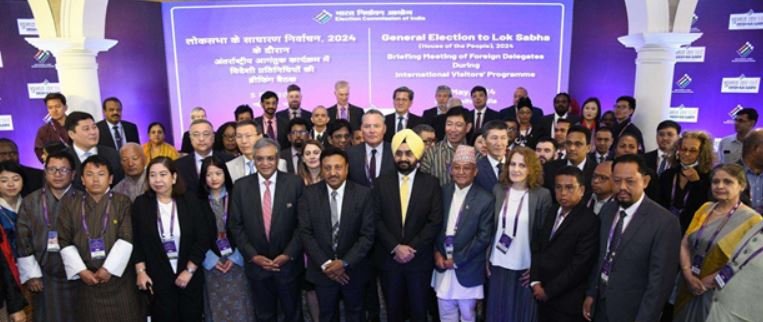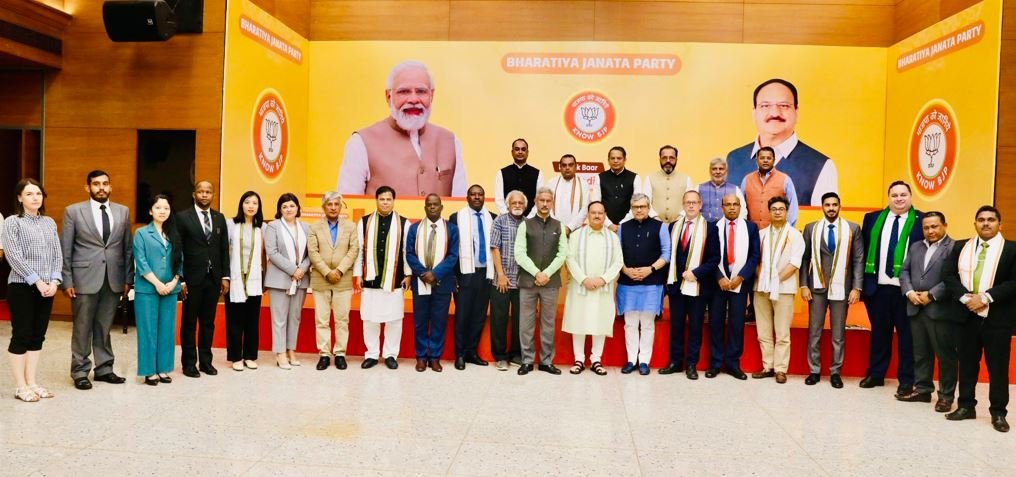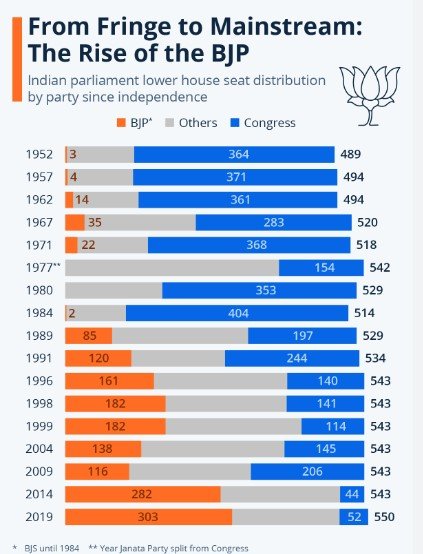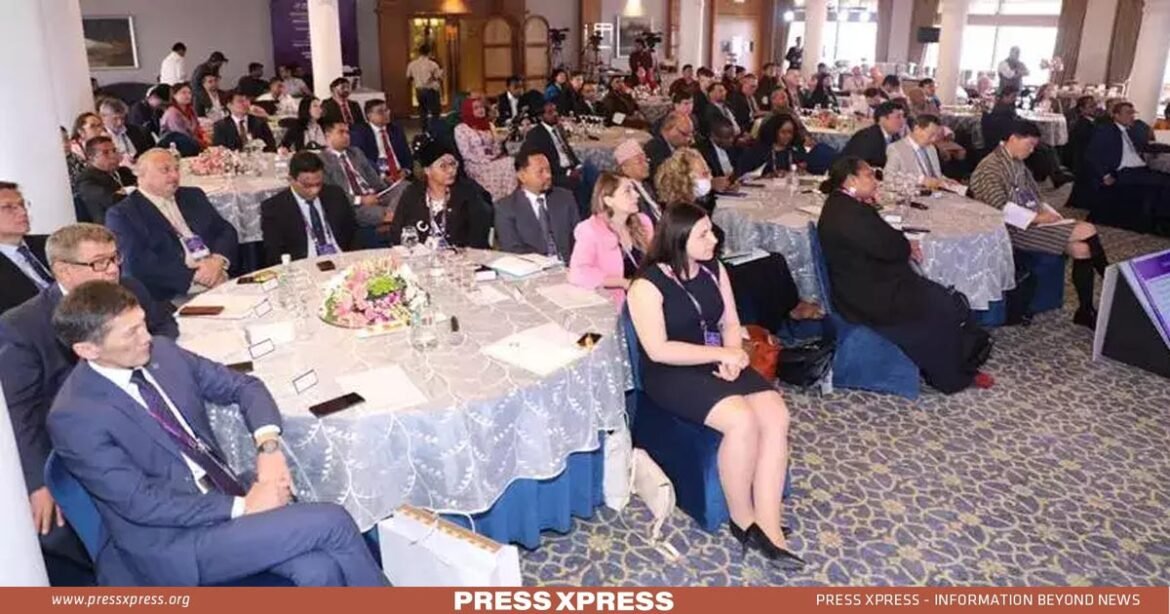India’s General Elections have once again captured global attention as the Election Commission of India (ECI) hosts its International Election Visitors’ Program (IEVP). The program has welcomed 75 delegates from 23 countries to observe the world’s largest elections unfold. The inauguration ceremony, held in New Delhi, featured the presence of Chief Election Commissioner Rajiv Kumar, along with ECs Gyanesh Kumar and Sukhbir Singh Sandhu on Sunday, May 5.
You Can Also Read: India Election Live: Narendra Modi Votes in Third Phase of Lok Sabha Polls
This initiative marks a significant milestone in terms of scale and participation. The invited delegates represent various Election Management Systems (EMBs) and organizations from the following 23 countries: Bhutan, Mongolia, Australia, Madagascar, Fiji, Kyrgyz Republic, Russia, Moldova, Tunisia, Seychelles, Cambodia, Nepal, Philippines, Sri Lanka, Zimbabwe, Bangladesh, Kazakhstan, Georgia, Chile, Uzbekistan, Maldives, Papua New Guinea, and Namibia.
Twenty-three nations, along with members from the International Foundation for Electoral Systems (IFES) and media teams from Bhutan and Israel, will participate in the upcoming event. The Election Commission of India (ECI) stated that this initiative showcases its dedication to conducting elections of the highest caliber, offering a valuable opportunity for Electoral Management Bodies (EMBs) to witness democratic excellence firsthand.

The ECI announced, “The Election Commission of India continues to foster international cooperation by organizing the Election Visitors’ Program (IEVP) during the ongoing Lok Sabha Elections 2024.”
Commencing on May 4th, the program aims to familiarize foreign EMBs with the intricacies of India’s electoral system and the best practices employed by the world’s largest democracy, as per the ECI’s statement.
Subsequently, the delegates will divide into small groups to observe polling operations and related preparedness in various constituencies across six states – Maharashtra, Goa, Gujarat, Karnataka, Madhya Pradesh, and Uttar Pradesh. The program will conclude on May 9th.
‘Democratic Surpluses’
Addressing the delegates, India’s Chief Election Commissioner Shri Rajiv Kumar emphasized the significant role played by the Indian electoral space and the work of the Election Commission of India (ECI) in the global democratic landscape.
He explained that the processes and capacity generated by the ECI result in what can be termed ‘democratic surpluses,’ which hold immense importance amidst concerns about shrinking democratic spaces worldwide.
Unlike some countries, India does not mandate electoral registration or compulsory voting. Instead, the ECI operates persuasively, encouraging citizens to voluntarily join the electoral roll and participate in the democratic process. The high voter turnout and nearly complete electoral rolls are evidence of the credibility of India’s electoral processes.
With a massive electorate of 970 million, supported by over 15 million polling personnel across one million polling stations, India’s diversity is fully expressed during elections. Shri Kumar invited the delegates to witness this vibrant festival of democracy firsthand.
Awami League Too Invited to Watch India LS Polls
In what can be seen as a major boost to bilateral relations, the ruling Awami League party of Bangladesh has sent its representative to observe the ongoing Lok Sabha elections in India at the invitation of the BJP.
Bangladesh Prime Minister Sheikh Hasina chose Salim Mahmud, Member of Parliament and the Awami League’s information and research secretary, to visit India from May 1 to 5 to witness the world’s largest elections. Mahmud held meetings with senior BJP leaders during the course of his visit. He also went to Chhattisgarh to witness first-hand the BJP’s election campaign in that state.

Bangladesh is among 10 nations from where the BJP has invited 18 political parties to witness the ruling Indian party’s election campaign as well as the overall poll process. The representatives of these 18 parties from 10 countries met BJP chief JP Nadda and foreign minister Dr S Jaishankar at the party’s headquarters on May 1.
“Had an engaging discussion on BJP’s election campaign strategies and the overall electoral process with representatives of eighteen political parties from ten countries at the BJP HQ. It was a part of our ‘Know BJP’ initiative. This initiative isn’t just about sharing our achievements; it’s about inspiring others by showcasing the contributions and sacrifices BJP has made for nation-building,” Nadda posted on X.

Who are ECI’s Observers and What is Their Duty??
The Election Commission of India (ECI) appoints Observers who play a crucial role during elections. These appointees work under the authority of the ECI, overseeing the electoral process from their appointment until the completion of the election. The Representation of the People Act, 1951 was amended to grant statutory powers to these Observers, allowing them to monitor the conduct of elections, especially during vote counting.
The General and Police Observers assist the ECI in ensuring free and fair polls. They manage the electoral process at the field level, acting as the Commission’s eyes and ears. Their responsibilities include providing direct feedback to the ECI, interacting with election machinery, candidates, political parties, and voters. Their goal is to ensure strict compliance with election-related rules, procedures, and guidelines.

India’s general election, held from April 19 to June 1 across seven phases, involves a massive electorate of nearly 970 million people, making it as the world’s largest election and democracy. The voter turnout is comparable to Western democracies, with 60-70% of eligible voters expected to participate.


